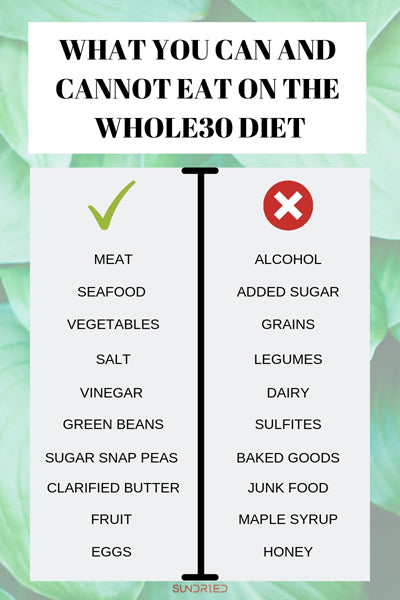What Is The Whole30 Diet And What Can You Eat On It?

We take a closer look at the popular Whole30 diet which was created by husband and wife team Melissa and Dallas Hartwig. What is it and what can you eat on it? These questions and more answered below.
The Whole30 diet is not primarily a weight loss diet, instead it is an 'elimination' diet which aims to identify 'triggering' foods which may be stopping you from feeling at your best. Is bread making you bloated? Could dairy be the reason you can't sleep at night? The Whole30 diet sets out to answer these questions for you and weight loss and wellness may just be happy side effects.
The bad news is that because of the nature of elimination diets, the Whole30 diet can be tough to follow as it means giving up a lot of your favourite foods. Withdrawal symptoms can become rampant meaning if your willpower isn't strong enough you could cave in and end up binging, which is even more unhealthy than eating your favourite treats in moderation.
The number 30 in the name Whole30 refers to the number of days you are expected to stay true to the diet. This means it is not a complete lifestyle change and is not something you should adopt long-term. You are supposed to slowly re-introduce the potential trigger foods after the 30 days so that you can identify which (if any) are causing you issues. For example, if you eliminate dairy from your diet and for the 30 days you can sleep well and once you re-introduce it you go back to having insomnia, it's a fair sign that dairy doesn't agree with you.
What can you eat on the Whole30 diet?

Eat real food.
You're encouraged to eat meat, seafood, and eggs as these are reliably sources of protein and essential amino acids. You are also encouraged to eat plenty of vegetables as well as some fruit. Plenty of natural fats such as avocado, nuts and seeds, and you're allowed all your favourite herbs and spices.
The point is to stick to 'real' natural foods which don't contain any chemicals or ingredients your can't pronounce, or better yet foods that don't even have a nutrition label because they're whole, non-packaged foods.
No: Avoid for 30 days.
- Do not consume added sugar, real or artificial. No maple syrup, honey, agave nectar, coconut sugar, date syrup, stevia, Splenda, Equal, Nutrasweet, xylitol, etc. Read your labels, because companies sneak sugar into products in ways you might not recognize.
- Do not consume alcohol, in any form, not even for cooking. (And ideally, no tobacco products of any sort, either.)
- Do not eat grains. This includes (but is not limited to) wheat, rye, barley, oats, corn, rice, millet, bulgur, sorghum, sprouted grains, and all gluten-free pseudo-cereals like quinoa, amaranth, and buckwheat. This also includes all the ways we add wheat, corn, and rice into our foods in the form of bran, germ, starch, and so on. Again, read your labels.
- Do not eat legumes. This includes beans of all kinds (black, red, pinto, navy, white, kidney, lima, fava, etc.), peas, chickpeas, lentils, and peanuts. No peanut butter, either. This also includes all forms of soy – soy sauce, miso, tofu, tempeh, edamame, and all the ways we sneak soy into foods (like lecithin).
- Do not eat dairy. This includes cow, goat, or sheep’s milk products like milk, cream, cheese, kefir, yogurt, sour cream, ice cream, or frozen yogurt.
- Do not consume carrageenan, MSG, or sulfites. If these ingredients appear in any form on the label of your processed food or beverage, it’s out for the Whole30.
- Do not consume baked goods, junk foods, or treats with “approved” ingredients. Recreating or buying sweets, treats, and foods-with-no-brakes (even if the ingredients are technically compliant) is totally missing the point of the Whole30, and will compromise your life-changing results. These are the same foods that got you into health-trouble in the first place—and a pancake is still a pancake, even if it’s made with coconut flour.
Some specific foods that fall under this rule include: pancakes, waffles, bread, tortillas, biscuits, muffins, cupcakes, cookies, brownies, pizza crust, alternative flour pastas, cereal, or ice cream.
No commercially-prepared chips (potato, tortilla, plantain, etc.) or French fries either. However, this list is not limited strictly to these items—there may be other foods that you find are not psychologically healthy for your Whole30. Use your best judgement with those foods that aren’t on this list, but that you suspect are not helping you change your habits or break those cravings.




